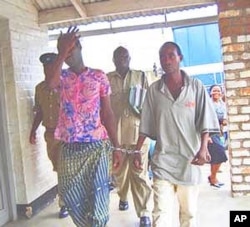In late December, two gay men held an engagement ceremony – and were promptly arrested. The event prompted a public debate over the legalization of homosexuality.
Sections 153 and 156 of the country’s penal code outlaw sexual intercourse between people of the same sex. But some human rights campaigners argue that the laws contravene the constitution and international conventions that guarantee equality and non-discrimination regardless of sexual orientation.
Section 20 of the Malawi Constitution says discrimination against persons in any form is prohibited and all persons are guaranteed equal and effective protection against discrimination because of race, color, sex, language, religion, political or other opinion, nationality, ethnic or social origin, disability, property, birth or other status.
Crispin Sibande, a human rights lawyer for the Malawi Human Rights Commission, says he thinks the phrase “other status” includes sexual orientation. He also describes the penal code as inconsistent with the Constitution, which deplores any form of discrimination.
“We have to change the law," he says, "mainly [to] conform to our penal code. When we allow homosexuals to come out in the open, we promote their right to health. We will make sure these people are accessing health services in terms of going through HIV testing and accessing treatment [if they are HIV-positive].
"They should be able to go the hospital and get treatment without being worried about whether the doctor will ask how [they] got this infection.”
Human rights law vs. tradition
But traditional leaders say allowing homosexuality would violate the country’s traditional values, which regard the practice as a taboo. But Sibande says as long as gay people live without violating other people’s rights, there is nothing wrong.
"I don’t think that is correct," he says. "I will give an example: in Malawi it was a taboo for a woman to put on trousers. It was a taboo for a woman to put on a miniskirt. But over the time we have debated these things and we have moved [away] from that.
"Now, homosexuals, in my understanding, are not demanding any extra rights. We are simply saying the same rights that everybody is enjoying; let those rights [be] enjoyed by them. Let them be accepted in…society.”
Malawi’s main religions are Islam and Christianity and in both religions same sex marriage is a sin.
Some religious leaders, like Apostle Felix Zalimba, the leader of the All for Jesus church, say homosexuality is immoral and that two people of the same sex can’t have sex and be accepted in society.
“It is the question of saying what the Bible," explains Zalimba. "The Bible is very explicit that homosexuality is not only a sin but also an abomination.”
Undule Mwakasungura is the executive director of the local NGO Centre for Human Rights and Rehabilitation.
“We strongly need to consider the human rights and freedom of gay people," says Mwakasungura, "so that they can enjoy the rights to equality before the law, and this should be done through amending our laws to accommodate groups such as gays. HIV-aids cannot be achieved without recognizing the groups such as the gay citizens.”
Ambokile Salimu, a legal expert, says "there are two alternatives to end this debate: referring the matter to the constitutional court or by holding a referendum - a broader approach to how the nation would address itself to the question of whether to legalize it or not, [where] people would vote on the issue.”
Several international rights groups have also added their voices to the debate. Amnesty International has accused the country of failing to respect international treaties it has ratified, including the International Covenant on Civil and Political Rights and the African Charter on Human and People's Rights.
Government officials have responded by saying Malawi is a sovereign state with its own laws and values. They say they did not realize that signing such agreements would also mean protecting the rights of gay people.
Ambivalence over public disclosure
The existence of homosexuals in the country is not in dispute, though their exact numbers are not known. In 2009, an online newspaper, Nyasatimes, reported on the formation of an association called the Malawi Gay Rights Movement.
But Malawi has long been hostile to gays. In 2005, the Anglican Church in Malawi rejected the appointment of a British vicar, Rev. Nicholas Henderson, as the bishop-elect of the Lake Malawi diocese. The church said it based its decision on his support for gay rights.
In this atmosphere, it is difficult to find anyone to publicly admit to being a homosexual in Malawi. They fear they will be ostracized at work and among family and friends. Many (gays) say they would rather have people assume without certainty that they are gay than confirm it themselves.
Most Malawians say that even if the law is repealed it will take a very long time for gays to be accepted because social attitudes are so slow to change.




